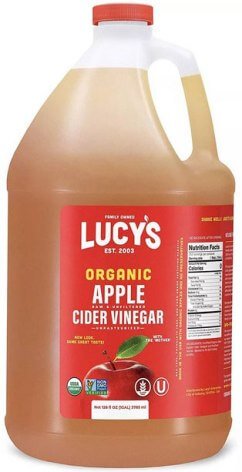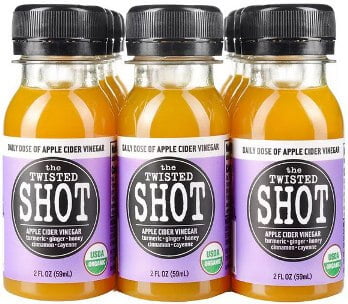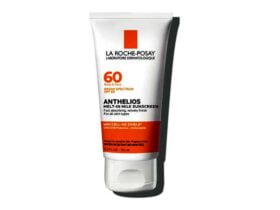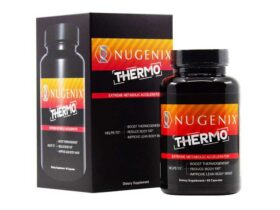By independently researching, testing, reviewing and recommending products we believe to be the best for healthcare professionals - learning more about our process along the way. Whenever you make a purchase through one of our links however (including when clicking on an Amazon link), we may earn commission fees which help support this website at no additional cost to you. Thank you!
Apple cider vinegar is well known for its tangy taste and potential health benefits. It has been shown to support weight loss in small studies, as well as improve cholesterol levels and blood sugar control. The health benefits are due to the “mother” content- which contains the beneficial bacteria, along with the antioxidant and acetic acid contents.
Eliza Savage, MS, RD, CDN recommends that people try different types of acv to see what works for them. However, raw ACV should only be used if it is unpasteurized and meant for general use. It can also have potential negative side effects when consumed in high doses or with certain medications.
For those looking to take advantage of the benefits of apple cider vinegar (ACV), we recommend using unpasteurized liquid forms. This is because studies have shown that isolated compounds in supplement pill, powder, or gummy form may not provide all the same health benefits as when ACV is consumed in its entirety as a liquid. Liquid ACV can also be added to dressings and sauces or simply sipped plain. We researched various options and decided on only unpasteurized liquids for our list due to their taste, ingredients, and nutritional content.
A dietician has listed the top apple cider vinegars below.
Bragg organic apple cider vinegar (Best Overall)

Pros: USDA Organic and Non-GMO; Raw, unfiltered, and unpasteurized; Versatile; Cons: Strong flavor if not diluted or combined with a dressing or sauce.
Who else has endorsed it?
The Spruce Eats and Healthline both recommended Bragg Organic Apple Cider Vinegar.
What claim buyers make?
90% of the more than 25,000 Amazon reviewers gave this item four stars or above.
The most versatile and high “mother” content product on our list is Bragg Organic Apple Cider Vinegar. This raw, unfiltered, and unpasteurized vinegar has higher acetic acid concentrations (5%, per the company), as well as “healthy” bacteria that may enhance the health of your gut microbiota.
The versatile pantry staple Bragg is useful for a variety of uses. You can make a smooth and tangy salad dressing by combining it with extra virgin olive oil, or you can make a drink by combining 2 teaspoons of vinegar with 8 ounces of water, a squeeze of lemon juice, and a few drops of maple syrup.
At the time of publishing, it cost $15
Serving size: one tablespoon;
servings per container: 252;
raw/unpasteurized: Yes;
unfiltered: Yes;
non-GMO: Yes; and
USDA organic: Yes.
Lucy’s Organic Apple Cider Vinegar (Best Budget-Friendly)

Pros: Consists of none of the following: Raw, unfiltered, unpasteurized, USDA Organic, and non-GMO Cons: Strong flavor if not diluted or combined with a sauce or dressing Depending on how frequently something is used, bulk size may not be appropriate for everyone. The best way to save money is to buy in quantity.
When purchased in bulk, apple cider vinegar offers a better bargain because it has a two-year shelf life once opened.
Before committing to this gallon-sized jug, it might be a good idea to try out a tiny bottle of ACV if you’re new to it.Try the one-gallon bottle of raw, unfiltered, and unpasteurized Lucy’s Organic Apple Cider Vinegar if you’re prepared to commit to using ACV regularly.
At the time of publishing, it cost $24
Serving size: 1 tablespoon
Servings per container: 252
Raw/unpasteurized: Yes
Unfiltered : Yes
Non-GMO: Yes
USDA Organic: Yes
Vermont Village Organic Apple Cider Vinegar Variety Pack (Best Beverage)

Excellent flavor thanks to organic fruit, ginger, turmeric, and honey; USDA organic and non-GMO
Less adaptable than ordinary ACV variations; raw, unfiltered, and unpasteurized
Pure apple cider vinegar is not as tasty as Vermont Village Organic Apple Cider Vinegar.
These drinks feature unpasteurized, unfiltered raw apple cider vinegar with the “mother” and available in four antioxidant-rich varieties created with organic fruit, including cranberry, blueberry, ginger, and turmeric. Honey is also added for a hint of sweetness.
Each container provides eight servings, each of which is 1 fluid ounce and has 25 calories and 6 grams of sugar. Take a shot of this beverage or diluted it with water to make a nice, sipsable ACV beverage.
At the time of publishing, it cost $20
At the time of publishing, it cost $20
Serving size: 1 ounce
Servings per container: 8
Raw/unpasteurized: Yes
Unfiltered : Yes
Non-GMO: Yes
USDA Organic: Yes
The Twisted Shot Organic Apple Cider Vinegar Shots (Best Shot)

Pros: Positives USDA Organic and non-GMO; great flavor from honey, ginger, turmeric, and cayenne; raw, unpasteurized, unfiltered Cons: Single-use plastic trash; Less adaptable than conventional ACV variations
The Twisted Shot Organic Apple Cider Vinegar Shots are a two-ounce shot with a potent dose of ACV and antioxidants. The “mother” of raw, unfiltered ACV is combined with honey, ginger, turmeric, and cayenne in these single-serve shots.
1.5 tablespoons of ACV, 25 calories, and 5 grams of sugar are found in each shot.
At the time of publishing, it cost $37
Serving size: 2 ounce
Servings per container: 1
Raw/unpasteurized: Yes
Unfiltered : Yes
Non-GMO: Yes
USDA Organic: Yes
Final Verdict
Try Bragg Organic Apple Cider Vinegar for a flexible, raw, unfiltered, and unpasteurized ACV to use in beverages and dressings (view at Amazon). This product is as pure and straightforward as it gets because there are no additional ingredients or flavors.
The Qualities of a Good Apple Cider Vinegar
The “Mother:”
ACV’s “mother,” or the byproduct of the fermentation process that contains proteins, enzymes, and “good” bacteria, is thought to be responsible for many of the possible health benefits. Raw, unprocessed, and unpasteurized goods will have more mother. You should be able to see murky strains floating in the ACV when you hold up a bottle of it.
Type:
Compared to its pure liquid form, the advantages of ACV when taken alone as pills, gummies, or powder (sometimes with other nutrients) are less well understood. The raw, unfiltered, and unpasteurized liquid form of ACV is the subject of the scant study on its health benefits. Choose a liquid form with the mother if you can stand the taste.
FAQ:
When should you take apple cider vinegar?
The ideal time of day to ingest apple cider vinegar is not currently the subject of any verified research. Utilize ACV when it best fits into your schedule. It is ideal to include apple cider vinegar in a balanced diet that includes fruits, vegetables, healthy fats, whole grains, and lean proteins.
How should I consume apple cider vinegar?
The most effective manner to consume apple cider vinegar mostly depends on your taste preferences. If you’re using pure ACV, try whisking it into a dressing with extra virgin olive oil or making a beverage out of it by diluting it with water. I suggest adding one tablespoon of apple cider vinegar and half a lemon’s juice to eight ounces of water, advises Savage. For a morning boost, you may also try flavoring ACV injections.
Depending on the manufacturer and the potential health advantages you want to obtain, different ACV dosages are advised. The recommended daily dosage is often between one and two tablespoons. Start with one tablespoon, then increasing the amount as tolerated.
When evaluating your ACV intake, be sure to take the potential adverse effects into account.
Is apple cider vinegar beneficial to health?
Although there is little study on apple cider vinegar’s health benefits, some data suggests that it may help weight loss2, lower cholesterol levels10, and improve blood sugar regulation.
34 However, if you’re trying to control your blood sugar, your main focus should be on tried-and-true strategies centered on a balanced diet that includes fruits, vegetables, healthy fats, whole grains, and lean meats and is high in high-fiber carbohydrates.
While excessive usage of undiluted ACV does not seem to have any adverse side effects when used in moderation, it might cause dental enamel erosion, potassium depletion (particularly when used with certain drugs), and gastrointestinal issues like nausea and sluggish stomach emptying.
The ultimate message is that most people can benefit from include moderate amounts of apple cider in their diets. Additionally, it helps improve the flavor of foods high in nutrients, such as whole grains and vegetables.
The effects of apple cider vinegar?
Research on ACV’s potential to lessen postprandial (or post-meal) blood sugar and insulin increases seems to be the most promising. 11 Various hypotheses are being investigated, but apple cider vinegar’s acetic acid concentration may inhibit some enzymes, affecting how well carbohydrates are absorbed. 1213 As a result, this effect might lessen the quantity of glucose from food that enters the bloodstream.
The effects of acetic acid on insulin sensitivity and the effectiveness of glucose uptake in skeletal muscle mass, which would lower the amount of glucose in the blood, are also being investigated.
14 ACV may improve glycemic management and blood lipid levels by reducing endogenous (or internal) synthesis of fatty acids and glucose in the liver.
1516 The potential health advantages of apple cider vinegar and its methods of action require more study.
Can apple cider vinegar spoil?
Since apple cider vinegar contains a significant amount of acid, which acts as a natural preservative and antibacterial, it often has a long shelf life.
17 The manufacturer will often specify a shelf life for the majority of ACV bottles, which can be anywhere between two and five years. If not properly stored with a tight cover after being opened, it may be more prone to oxidation and content disintegration.











Leave a Review